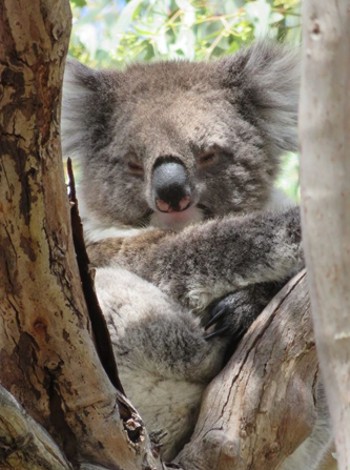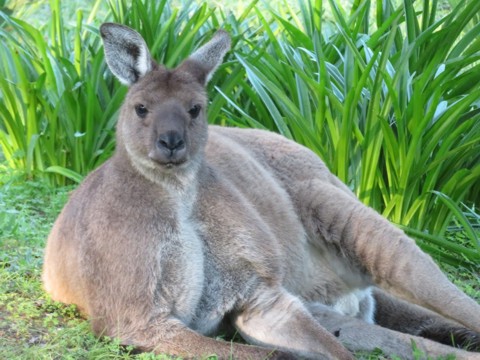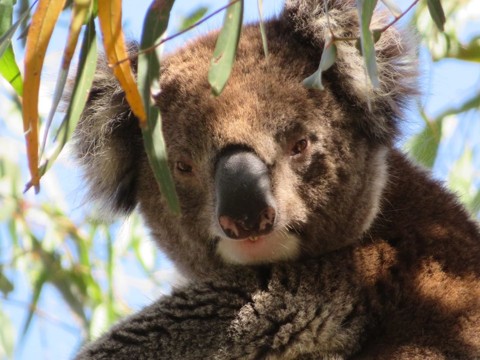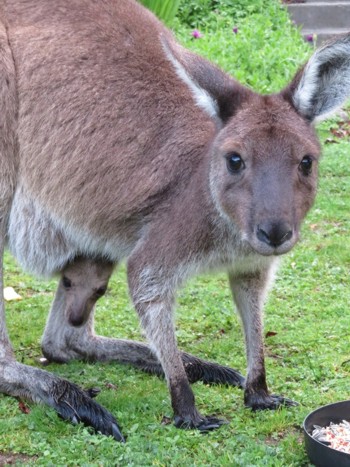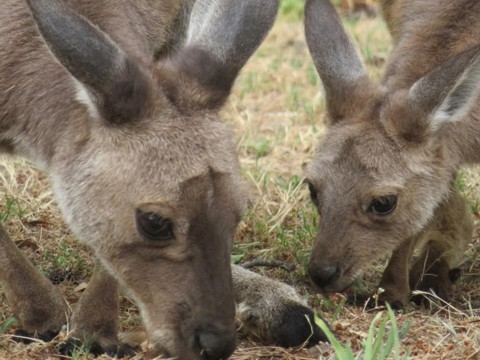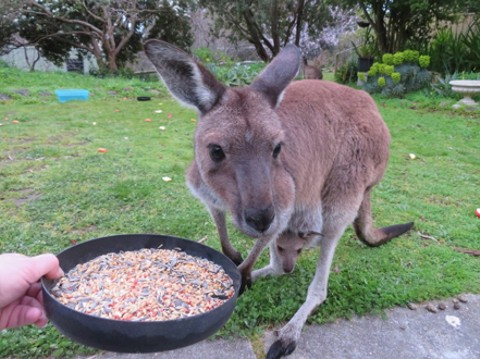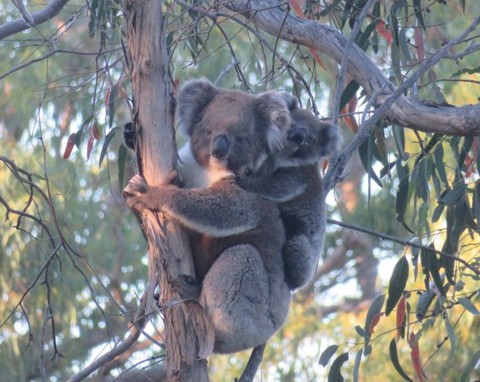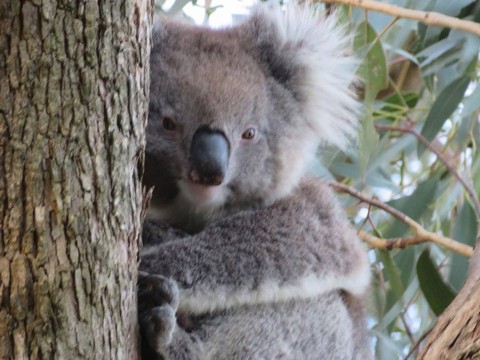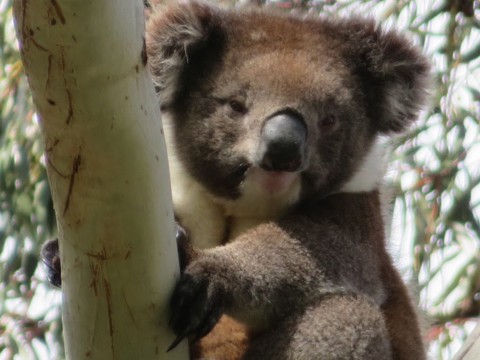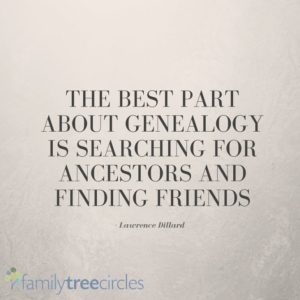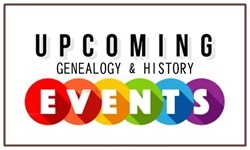Koalas and Kangaroos!
Randy Seaver author of the well-known genealogy blog, Genea-Musings, recently posed the topics of “Your Other Hobbies or Interests” for his “Saturday Night Genealogy Fun” weekly blog post, and it has spurred me to get writing again.
So just what are my other hobbies and interests?
Reading is one, and I’m a collector of various things, there’s no doubt about that. One of those is my 19 Crimes collection of corks and wine bottles, that is still growing slowly. But other than that … not so much of a hobby, but more of a passion, is keeping an eye on the local wildlife in my area.
So my answer is … koalas and kangaroos.
I live in the Adelaide Hills area of South Australia, and am incredibly fortunate to have koalas and kangaroos come and visit regularly. So regularly, that I can identify them, and have named many of them.
So let me introduce you to my girl koala Boomer, and a few of my regulars …
So what started with me going out for a walk and photographing the wildlife I saw along the way and putting some pictures on on Facebook for my friends, has resulted in my koalas and kangaroos totally having fans.
They suggested I should make a calendar from all my koala pics, so I did this and made a 2020 calendar which went well, and Boomer and her friends made it to many corners of the world. So recently I’ve been busy working on my 2021 calendar, and now Boomer has her own Facebook page as well. So it’s been keeping me busy, combine that with creating a proper separate website and there is absolutely no genealogy time at present.
Everyone has their ‘happy place’ – the place they love, the thing they love doing! Seeing my kangaroos and koalas is most certainly mine. It is just so good for the soul!
Just a side note: please note when I say I got out photographing the wildlife, I am absolutely not a pro-photographer. In fact I’d call myself a snapper, since my camera is simply a little auto-everything one. A lot of pics don’t turn out, but some do, and they look pretty good!
So that’s my other hobby/passion … what’s yours?
P.S. If you are interest in more koala pics, feel free to follow my Boomer and her friends Facebook page, and if you like the idea of looking at koalas all year round, you can find my koala calendar on sale here.
Activities for the Genealogist While Self-Isolating
Are you currently in lockdown, quarantined or self-isolating at home? Looking for some ideas to fill the day?
I know that I could simply write “research” here and you’d all be happy (I would be), but for those of you who may need a break from just “research” on occasions, or don’t have the longer spurts of time required for researching, there’s plenty of useful genealogy-related activities that you can still do. Here’s a few ideas…
————————–
![]() WATCH – Webinars & Videos
WATCH – Webinars & Videos
Webinars and videos are a fantastic way to learn in your own time, and from the comfort of your own home. There literally thousands available to watch, and that’s without going to YouTube and searching for more, and most of them are free.
– Ancestry Academy – Short tutorial videos, covering Ancestry, DNA, methodology and more.
– FamilySearch Webinars – Watch webinars on researching in different countries, as well a numerous general topics (organisation, DNA etc.), as well as how to master the FamilySearch website.
– Legacy Family Tree Webinars – This one is a pay site, but at less than US$50/year, and access to over 1000 tutorial videos, it is SOOO worth it. But just so you know all newly added videos are free for 7 days, before they then go behind the paywall, and you will then need to pay or subscribe.
– MyHeritage Education – There are a heap of webinars available covering how to use the MyHeritage website to advantage, as well as how to build a family tree, general research basics, well as DNA and health tutorials.
– The National Archives (UK) – From using Discovery, to workhouse records, emigration, musters and militia, King Henry VIII, and a whole heap more.
– National Library of Australia – Watch videos on Trove, copyright, old Australian ephemera, media and more.
– New South Wales State Archives – Learn about how to use the NSW State Archive website, and the incredible collection of records they hold.
————————–
![]() LISTEN – Podcasts
LISTEN – Podcasts
Download some podcasts and listen to them while doing other activities.
– AdeLOL – Listen to Adelaide’s history like you’ve never heard it told before
– CutOff Geans – If you’re genealogy interest is specifically DNA, join Julie DIxon Jackson and Renee Colvert as they attempt to guide you through what it takes to use DNA to break down brickwalls, solve mysteries – or find your “people”!
– Downunder Genealogy – This podcast began last year, and there are 10 episodes. Created for Aussie’s, Michael Larman wanted a genealogy podcast with Australian content.
– Extreme Genes – Scott Fisher hosts this podcast and in it he shares genealogy resources and techniques to keep the genealogy researcher moving forward in researching their ancestors.
– Forgotten Australia – Forgotten Australia has been telling the stories we didn’t hear in history class. From the weekend Melbourne went mad and our forgotten Titanic hero, to Australia’s greatest Aboriginal tracker and the murder wave that shocked Sydney in 1932, this is history as you’ve never heard it before.
– Genealogy Gems – Lisa Louise Cooke helps you make the most of your family history research time by providing quick and easy-to-use research techniques. Producer and host Lisa Louise Cooke brings you the best websites, best practices, and best resources available.
– The Genealogy Guys – Listen to George Morgan and Drew Smith chat about different genealogy topics every episode.
– Genies Down Under – This podcast is not currently running, but you can still listen to all the old episodes.
– History Council of South Australia – This link includes links to other podcasts Australia history related podcasts
– National Library of Australia – Listen to various talks that have been recorded at the NLA.
————————–
![]() WRITE – Transcribing & Indexing
WRITE – Transcribing & Indexing
If you’re feeling like ‘giving back’ to the genealogy community, why not sign up for a transcription project or two. There’s plenty on offer, and they cover all sorts of records. Remember every name indexed, is another name that someone can find. Every little bit helps.
– Australian War Memorial – Their transcription tool on the AWM website is not currentlyworking, but they expect to be back online later this year. So keep an eye on the page if you’re interested in their projects.
– Biographical Database of Australia – The BDA is a project that gathers data from government and private sources in the post-convict era in all Australian colonies, and include early published biographical dictionaries, newspapers, diaries and letters.
– Discovering Anzacs – The Discovering Anzacs site a diverse selection of government records about Australians and New Zealanders in World War I and the Boer War.
– FamilySearch Indexing – FamilySearch always has indexing projects on the go, and currently they have over 100 projects from over 20 countries, so you’re sure to find a project that interests you. So pick a country, see what records are available to index. Look at the introductory videos, foloow the step-by-steps, and you’re good to get going.
– Founders and Survivors – Founders & Survivors is a partnership between historians, genealogists, demographers and population health researchers. It seeks to record and study the founding population of 73,000 men women and children who were transported to Tasmania. Many survived their convict experience and went on to help build a new society.
– German-Australian Genealogy & History Alliance – South Australia Land Tax Assessment Registers – This project started a few years ago, but isn’t finished yet. So if you’re interested in helping out, sign up.
– Measuring the Anzacs – Measuring the Anzacs is a NZ military project that contains about 3.7 million pages of images from 140,000 New Zealand service members’ files. The project is currently concentrating their efforts on transcribing History Sheets, Attestations (enlistment forms), Statements of Service, and Death Notifications.
– National Archives of Australia (The arcHIVE) – The arcHIVE, or HIVE as it is commonly known, is the National Archives of Australia’s online transcription portal. It enables volunteers to transcribe digitised item/consignment lists and other records such as Cabinet notebooks, migration records and Post Office records. HIVE gives everyone the chance to help describe items in the collection which are not able to be identified and accessed because they have yet to be listed or described on our online collection database, RecordSearch. To date over 500,000 descriptions of records have been transcribed through HIVE and added to NAA’s RecordSearch.
– The Prosecution Project – Criminal trials have been taking place in Australia since the first days of settlement. The archives of the Australian states are holders of these records, which are among the most complete in the world. The potential of these records for use by family historians as well as researchers has been recognised. The Prosecution Project has started digitising the registers of Supreme Court cases from around Australia, as these record the names of accused as well as their offences and the outcomes of the trials.
– The Ryerson Index – This massive collaborative project has now indexed over 7.4 million death and obituary records from Australian newspapers. They do have some transcription vacansies available at present, so check their website for details.
– State Library of New South Wales – The State Library of NSW has numerous transcription projects on the go, including Captain James Cook’s papers, Sir Joseph Banks’ papers, World War I diaries and letters, and Rediscovering Indigenous Languages amongst others. Register now if you’re interested in helping transcribe.
– State Library of Queensland – The State Library of Queensland is dedicated to making its digital collections more visible and accessible online so that everyone can use and share them, and you can help by becoming a digital volunteer! Tag SLQs photos in Flickr Commons, text correct Queensland newspapers, help transcribe SLQ collection, or tell us your Queensland story.
– State Library of South Australia – The State Library of South Australia needs your help to make their digital collections more accessible and more meaningful so that everyone can use and share them. You can help, by becoming a digital volunteer.
– Trove Newspapers – Text correcting Australia’s old newspapers on Trove is probably Australia’s best known transcription project, and probably the biggest too. It’s just so easy. Simply register, and once logged in, and you’re searching for whatever article topic you choose, correct it when you find it. Then on to the next one. And it means that someone else will then be able to find that article when they go looking. If you’re not sure how to go about text correcting, there are tutorial videos.
– Who Do You Think You Are? Magazine – Over the last few years Who Do You Think You Are Magazine has organised a big-once-a-year-event called “Transcription Tuesday” with the aim of choosing several types of records, which people from all around the world, sign up to, to participate in transcribing them. This years event was held in early February, but due to the Coronavirus and so many people being at home, they are currently holding “Transcription Tuesday Weekly Challenge” every Tuesday (UK time). So keep an eye of their Facebook page or blog to see what records are up next, and sign up for it if you’re interested.
————————–
So as you can see, there is absolutely oodles to do while you’re stuck at home … that is apart from research, watching Netflix, jigsawing and walking the dog. I also know that I haven’t listed all that is available, not by a longshot. But there’s plenty there for anyone who is interested in listening and learning.
The range of topic available though all of these mediums (webinars, podcasts and transcriptions) is so varied I guarantee you will not get bored. I will also say that there is obviously an Australia slant to the list with a few overseas ones thrown in, but that’s thanks to the fact I’m an Aussie. But as mentioned above there are HEAPS more webinars, podcasts and transcription projects going on elsewhere in world. So just google if you want more.
Anyway stay safe, stay indoors, and keep learning.
The Genealogy Community
Genealogy, for the most part, is a solitary hobby. You sit at a computer and look for ‘your’ family online. You head off to the library, cemetery or archive for a day of research to find ‘your’ family. You correspond with others largely by email – so you get my point. It is usually a hobby that is yours … something YOU do.
But as with everything, there are exceptions, and you might be lucky enough to have a friend of family member to hang out with and help you along the way, but most of us don’t. But that doesn’t mean that genealogy is a lonesome hobby. NOT AT ALL. In fact, quite the opposite.
While we might do our research alone, there is this wonderful thing called the “genealogy community”. This is an amazing group of people who are there to share in your excitement, and frustrations, offer advice, and generally just be there for you when you need (genealogy related or otherwise).
For those who haven’t get seen or experienced the “genealogy community” you can find them on social media (Facebook, Twitter, Instagram, Pinterest and so on). Follow them, learn from them, comment on their posts, share them and encourage them.
How do you find people to follow? Do you read genealogy books or magazines? If so, who are the authors? They are all on social media, so why not start by following them? Do you watch genealogy on YouTube, or webinars or listen to podcasts? What about your local genealogy society? Go and find them on social media, and follow. Want more … use the hashtags #genealogy or #familyhistory and see what comes up. I guarantee you’ll find more people to follow … but also don’t forget #oldphotos and #cemetery are great hashtags to find like-minded people to follow too.
This way you will build up a group of people to follow on social media – to learn from them, to find out the latest products, to hear what event are coming up … and when you get the chance to meet them in person, it really is super exciting. And that’s what I found happened again at RootsTech in Salt Lake City recently (yes, I do still need to write a report on that for you … soon, hopefully).
Anyway I was reminded of just how wonderful the genealogy community is. Being an introvert and going to a conference with 20,000 or so people might sound daunting. But for me it is such a buzz. Each time I go, I make a few new friends, and get to catch up with others I’ve met before from all around the world, which is awesome. Facebook is good, but it doesn’t beat meeting up in person, and just having a chat.
So if you haven’t yet, I urge you to discover and join the ‘genealogy community’. Working in a genealogy bookshop, I still come across people who’ve been researching alone for 10-20-30 years, who have never been to a genealogy group, have never been to any society meetings, and in reality didn’t know that they even existed, let alone all the online collaborative help opportunities that are available now. So don’t do family history by yourself forever. There is a whole community out there who is willing to help you, and I guarantee you’ll find some friends …
7 Traits that Make a Good Genealogist
If you don’t like the idea of wandering a cemetery for hours, or spending a day in the archives, or if you hate the smell of old books … let me tell you that family history just isn’t for you. So can I suggest you take up photography, hiking, woodwork, scapbooking or knitting instead.
However for those that think the above is a perfect day out … welcome to “the tribe”. You are a fellow totally obsessed genealogist, and there’s nothing wrong with that. Nothing at all. We feel at ease with fellow genies, as they are part of our ‘tribe’. They ‘get’ us, and don’t eyeroll like the other family members. But what brings us together is our similarity in certain traits. Here’s just a collection of 7 main ones.
HAVE PATIENCE – Sitting in a library or archive and scrolling through microfiche, or paging through old record books is not for everyone. But a good researcher will know that you might be there for a day or two (or more), before your find who you’re looking for. That one person you’ve been hunting for years. And some days you don’t find them at all. Family history IS NOT a quick hobby. I know many people who have been been researching for 20, 30, 40 or more years. You may spend days, weeks or years looking for one person … and of course frustration sets in, but when you find them you’re on cloud 9 for a year!! Your patience finally paid off.
GET ORGANISED – This is a great trait to have, but it’s not one that comes naturally to many of us. When you start researching you will experience what is known as the “paperwork snowball”. Paperwork is everywhere, notes, documents, printouts, photos and more … and it seems to breed. But having all this useful information and tidbits is only useful if the relevant information is findable and retrievable quickly. In saying that, I know many, many people who have ‘the pile’. This is one that usually on the office floor and has paperwork stacked as high as the desk. It’s great that it is sort of in one place, but you have to agree it really isn’t retrievable. So why not make an hour each week to work on ‘the pile’, and you might be surprised at how quickly it goes down, not to mention what you might find in the pile that you’d forgotten about. And of course then there’s the digital filing too (emails, scans, photos, downloads … ).
QUESTION EVERYTHING – Be a detective and question everything. A good practice is not to accept a piece of evidence until you have it verified from 2-3 different sources. Names, dates, places … query everything. The how, the why, there where. The more you question and look for more sources to verify what you have, the better researcher you’ll be. Also look for the original records, not just at the indexes.
HAVE DETERMINATION – This could also be labelled as persistence or stubborness is what it comes down to. When we are after that clue that piece something together, we are stubborn, and keep researching. As per point 1, patience is also needed here, but ultimately you’ll find your answer if you stick with it.
SELF-EDUCATION – This one is really important, but probably not one that gets the credit it deserves. This can include going to seminars or conferences, watching YouTube videos (genealogy related ones!) or webinars, listening to any number of the genealogy podcasts, doing an online (or offline) genealogy course, or simply reading. Read books, read blogs, read genie mags … it is a great way to learn, and help yourself get self-educated. In essence the more you learn, the better researcher you’ll be.
BE POLITE – I shouldn’t have to mention this one, but I know I do. Be polite and courteous in your dealings with people online as well as those offline. Others do want to help you, but they won’t if you’re rude and demanding.
BE ETHICAL – When you get into family history, without a doubt you will find out some family secrets, many of which other family members don’t know. While it’s good to record these in your private tree, you shouldn’t broadcast these details to the world, as in many cases it can have huge ramifications, and it’s not your job to blurt it out. So ethics are required, and you just need to tread carefully.
I think of my fellow genie friends near and far, and I recognise so many of the above traits in them, as well as myself. So if you wanting to be a better genealogist, practice the above and I guarantee you will improve your research. I know there are more, and feel free to add your suggestions as a comment below.

